This article is the first in our My Game In My Words 2024 series. Check back here to find all future articles in the series.
In 2022, moments after making his first appearance for D.C. United in Major League Soccer, Christian Benteke sat down to speak to American media for the first time. After only 15 minutes on the pitch, there wasn’t a ton to talk about and quickly, Benteke found himself facing the same softball questions so many European imports field when they come to the United States.
Why, a reporter asked, had Benteke — an 11-year veteran of the English Premier League — come to D.C. United?
Incoming Major League Soccer players normally answer the question in the same way, using it as a chance to praise the league’s growth, or refer to their move as a unique opportunity to foster the expanding popularity of soccer stateside. Those answers sometimes feel disingenuous and media-trained. Benteke’s response did not.
“I really wanted to choose something that makes me happy,” he said, “and I’m ready to take any consequences. I just wanted to do something that would make me happy when I wake up. So that’s my whole decision. I didn’t really think about anything else.”
Benteke arrived at D.C. United in pursuit of happiness. And while it’s been a mixed bag for the club itself — D.C. haven’t made the playoffs since 2019 and sit on the periphery of them as we speak — the former Aston Villa, Liverpool and Crystal Palace striker has unquestionably been among MLS’ most commanding attacking players. He sits two goals clear of three players, including Uruguayan legend Luis Suarez, in the Golden Boot race and has established himself as one of the most aerially dominant players the league has seen. He has even registered more shots with his head than his right foot this season (below).
Things did not always come this easily from Benteke, who fled what is now known as the Democratic Republic of Congo at the age of three. He honed his skills in pickup games on the streets of Liege and his career followed a winding path through Belgium and England. Statistically, Benteke should be considered among the Premier League’s modern greats. He scored more than Carlos Tevez, Fernando Torres and Eden Hazard. His tally of 86 is one fewer than the great Dennis Bergkamp’s total at Arsenal, and Benteke did so in 35 fewer games. And he did all of that playing on teams who were, by and large, uncompetitive and often failed to craft their attack around him.
Nearly two years to the day after Benteke suggested he had moved to MLS to rediscover the joy of life, he strolls into United’s suburban training facility to sit down and watch a series of goals and moments from throughout his career. He’s just signed a contract extension and the idea that he might retire in MLS feels realistic. He is relaxed, calm and composed. When reminded of his very first comments in MLS — that his move to D.C. was largely centered on the joy of living — he smiles.
“Every day that I wake up, I feel grateful,” Benteke says. “Every day that I’m on my way to come to practice, I feel I’m doing a job I always wanted to do. And it reflects in the way that I’m playing.”
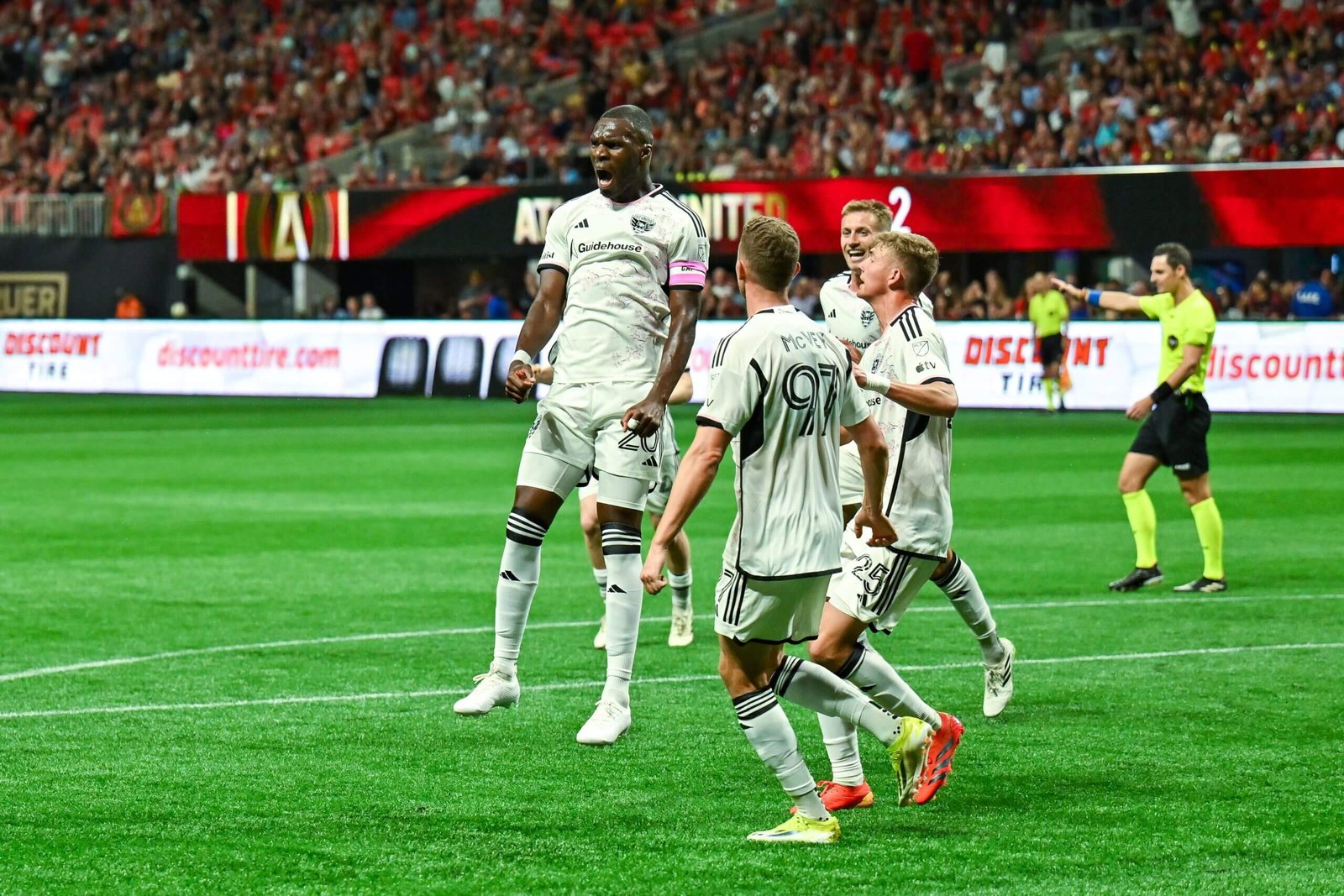
(Rich von Biberstein/Icon Sportswire via Getty Images)
The warmth and positivity are present in how he studies his goals over the next 30 minutes, which sometimes feels less like analysis and more like a warm stroll down memory lane.
This is Christian Benteke’s game in his words…
Benteke’s journey in organized soccer started at age six, in Belgium, in the shadow of the housing projects where he had been playing streetball. A local youth club, JS Pierreuse, spotted him, and his exploits there landed him in the youth system of Belgian giants Standard Liege. In 2007, in search of first-team minutes, Benetke traveled north, to Genk.
“I was happy,” says Benteke. “I had a clear vision. That’s the reason I went there, I left my childhood club, Standard Liege, this is where I grew up. At the time, you had Sebastien Pocognoli, Faris Haroun, Logan Bailly, those are the players I was looking up to and they were young; 16, 17 and 18 and playing with the first team. It was a chance to prove myself and that was why I decided to go and play for Genk because they were giving chances to young players.”
Benteke’s journey at Genk was no easier than his time in the Premier League. He struggled, initially, to adapt and ended up spending consecutive seasons out on loan. Only in 2011 did he truly carve out a productive spot with Genk, and he did so playing alongside another youngster who became one of modern football’s most complete players: Kevin De Bruyne.
“I’m two years older than him,” says Benteke, “and when I moved, he wasn’t even training with the first team. And then he came, from U-19 to the first team. He was really skinny but you could see, with his feet, he was going to be a top player.”
Benteke immediately recognizes the goal we show him (despite the grainy footage). He remembers almost every one he has ever scored, he says, when they’re played for him. De Bruyne’s vision has been the stuff of legend from his earliest days and things are no different here in this match against Anderlecht in April 2012, as he carves a diagonal path across midfield and receives a through ball some 40 yards from goal.
De Bruyne hesitates and then uses a wonderful touch to split two defenders.
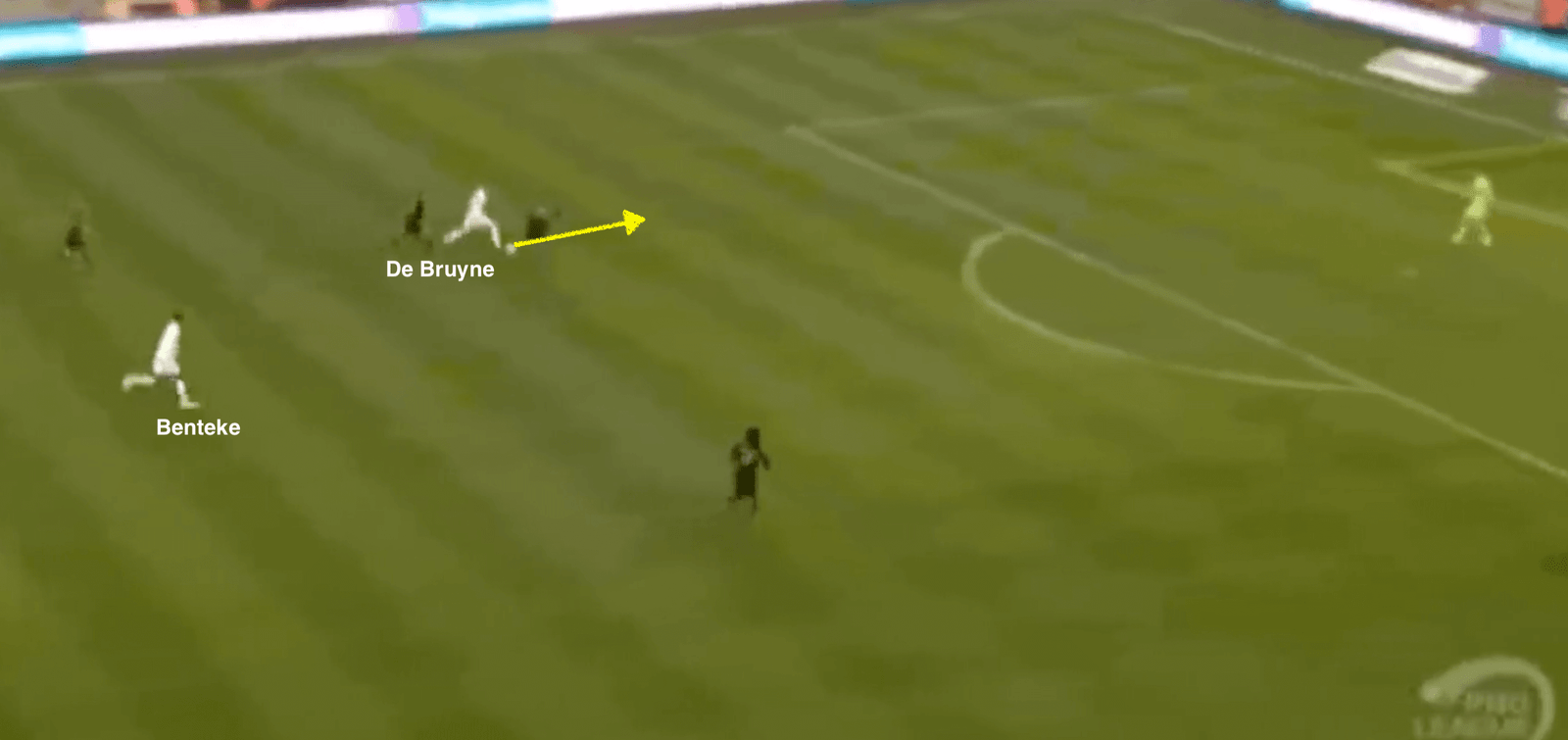
Benteke, in the meantime, is holding his run and arrives in the heart of the penalty area as De Bruyne makes a lovely pass back into space.
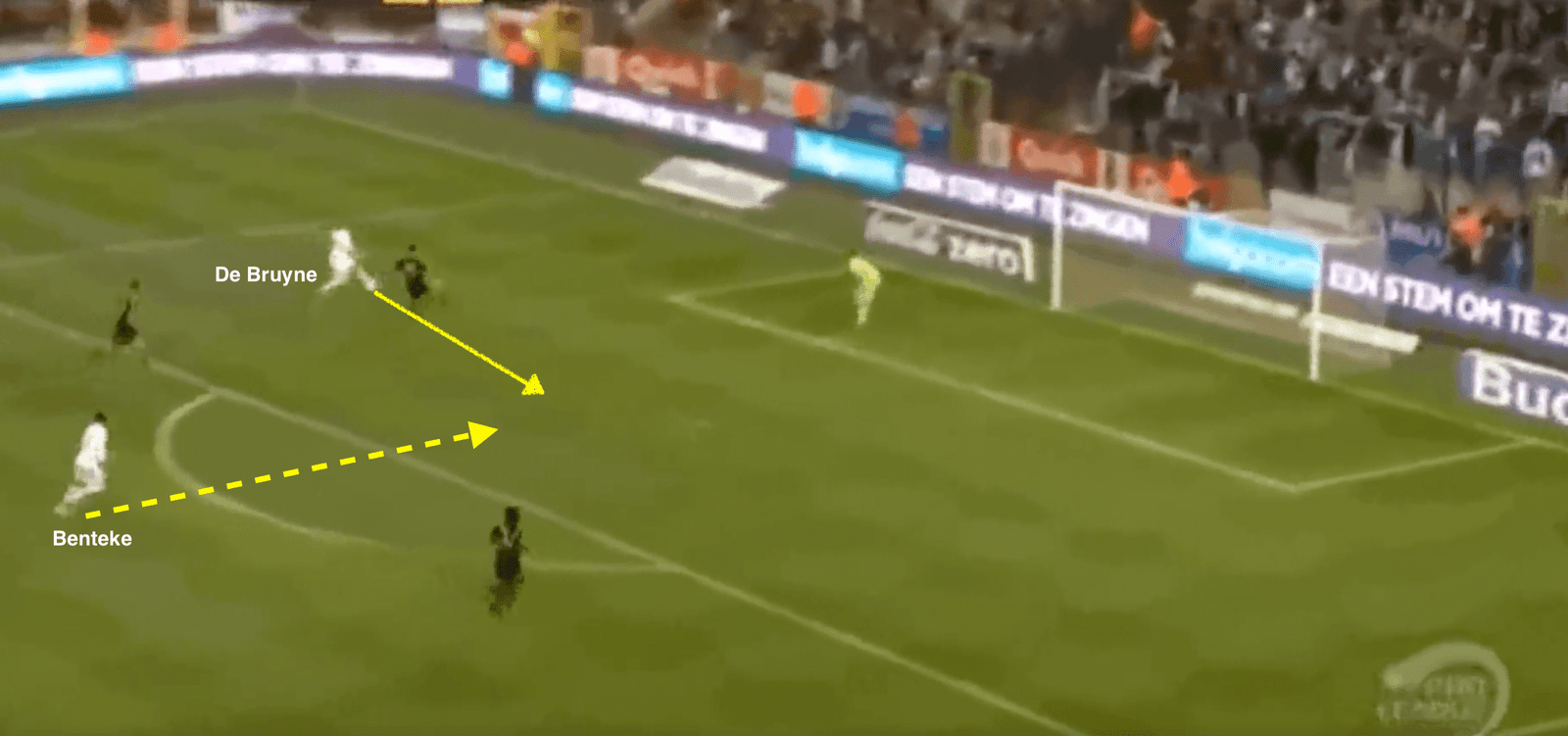
The goal is vintage Benteke: fearless, clinical, well-timed. He is wiped out by the defender as he guides the ball past the Anderlecht goalkeeper.
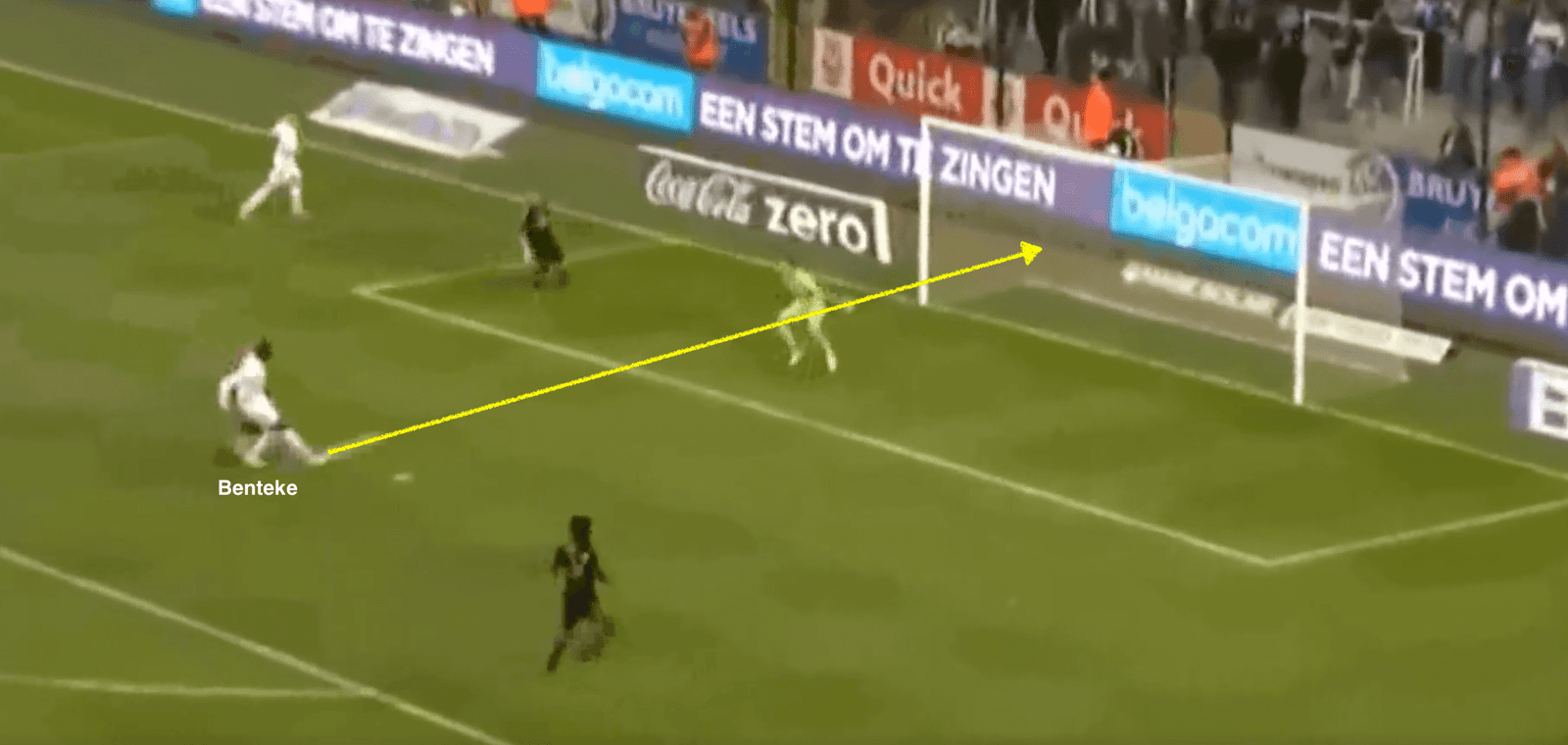
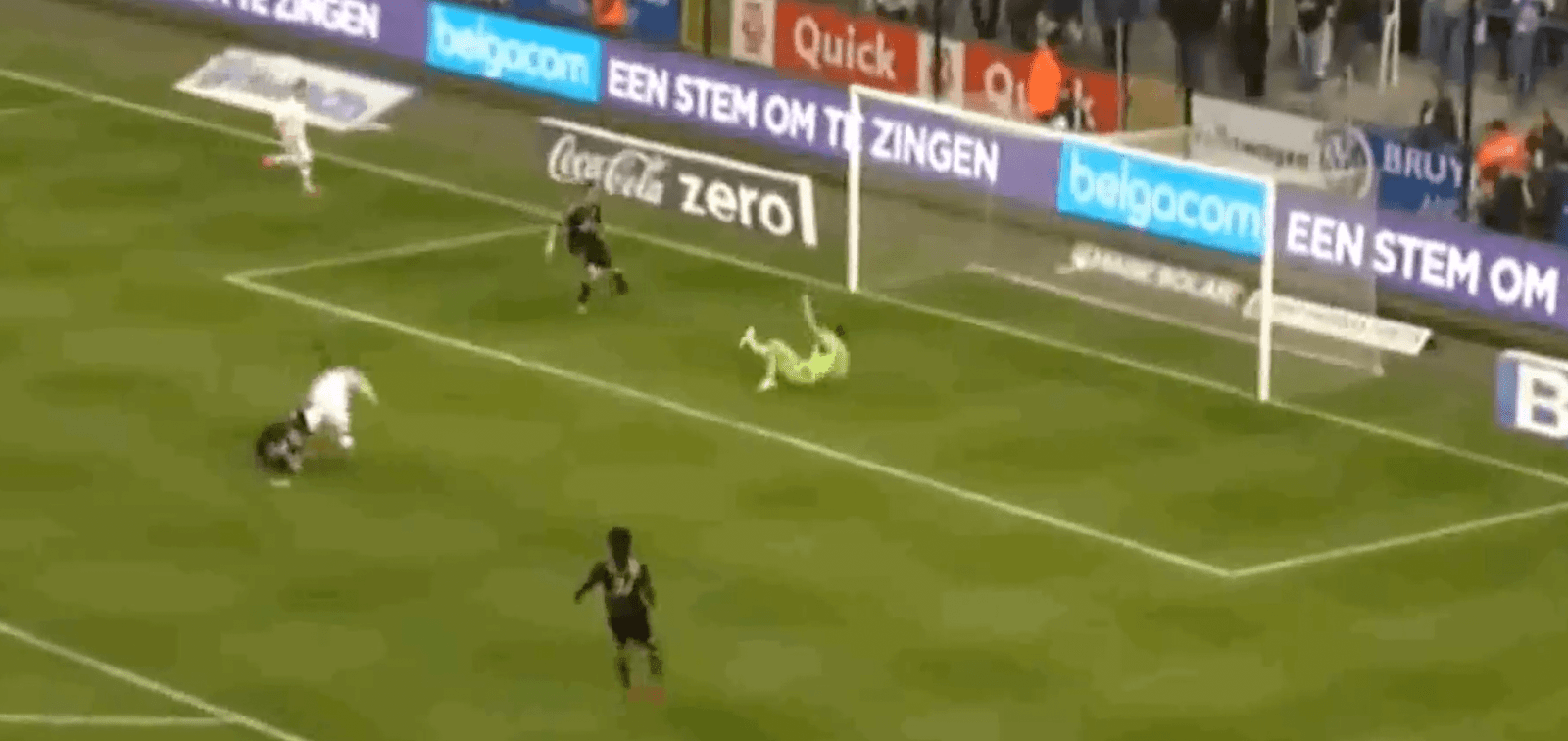
The striker has so far given little away but a smile creeps over his face as he watches. So much of his game has remained consistent over the years. He can’t put his finger on any advice he’d give his younger self.
“I would do nothing different,” he says. “I always had a clear vision. I wanted to be a superstar, no matter what. And I had to go through really hard times. My vision was clear. I wanted to be a superstar and get to the Premier League and I was ready to do that.”

Benteke scoring a powering header in February 2012 for Genk (Jimmy Bolcina/Photonews via Getty Images)
That vision became reality in 2012. Aston Villa paid £7million ($9.3m at current rates) to sign him from Genk, a massive amount in that era’s market for a largely unknown player. In the press and the stands alike, there was skepticism. Benteke remembers his nerves before his debut for the club, against Swansea City on September 15. He was introduced for his debut with 20 minutes to play and made it 2-0 to Villa after pouncing on a howler by Swansea center-back Ashley Williams. To this day, it remains his all-time favourite goal.
“It’s not the nicest goal but it was my first goal with Aston Villa,” says Benteke. “The reason I say that is because I was an unknown player, I’m coming from a small country, Belgium, moving to the big scene, scoring on my debut. The price that the club paid for me was really really high for an unknown player. That goal dictated the rest of my time in England. It gave me the confidence, the respect from my team-mates, and the love from the fans.”
Benteke was an immediate success at Villa and his productivity rarely waned. He scored 42 goals in 89 appearances with the club, including a pair of hat-tricks, the second coming against Queens Park Rangers in April 2015.
Benteke’s first two strikes of the evening were clinical, right-footed finishes. The first took a helpful deflection…
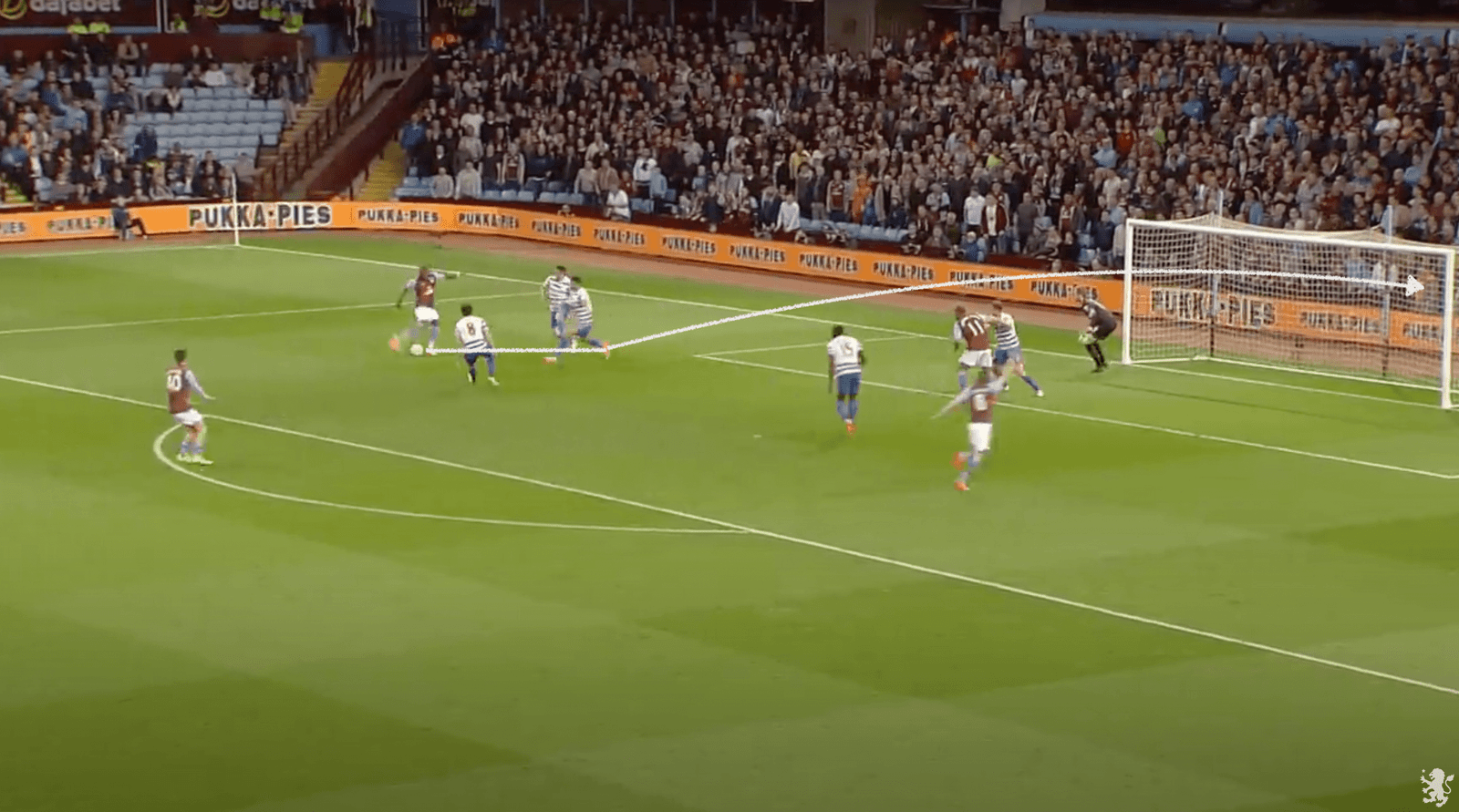
The second showed great technique, as he shaped to bend it in the far corner, using the QPR defender to shield the ball from the goalkeeper, before curling it into the near corner. Neither defensive player knew what was going on.
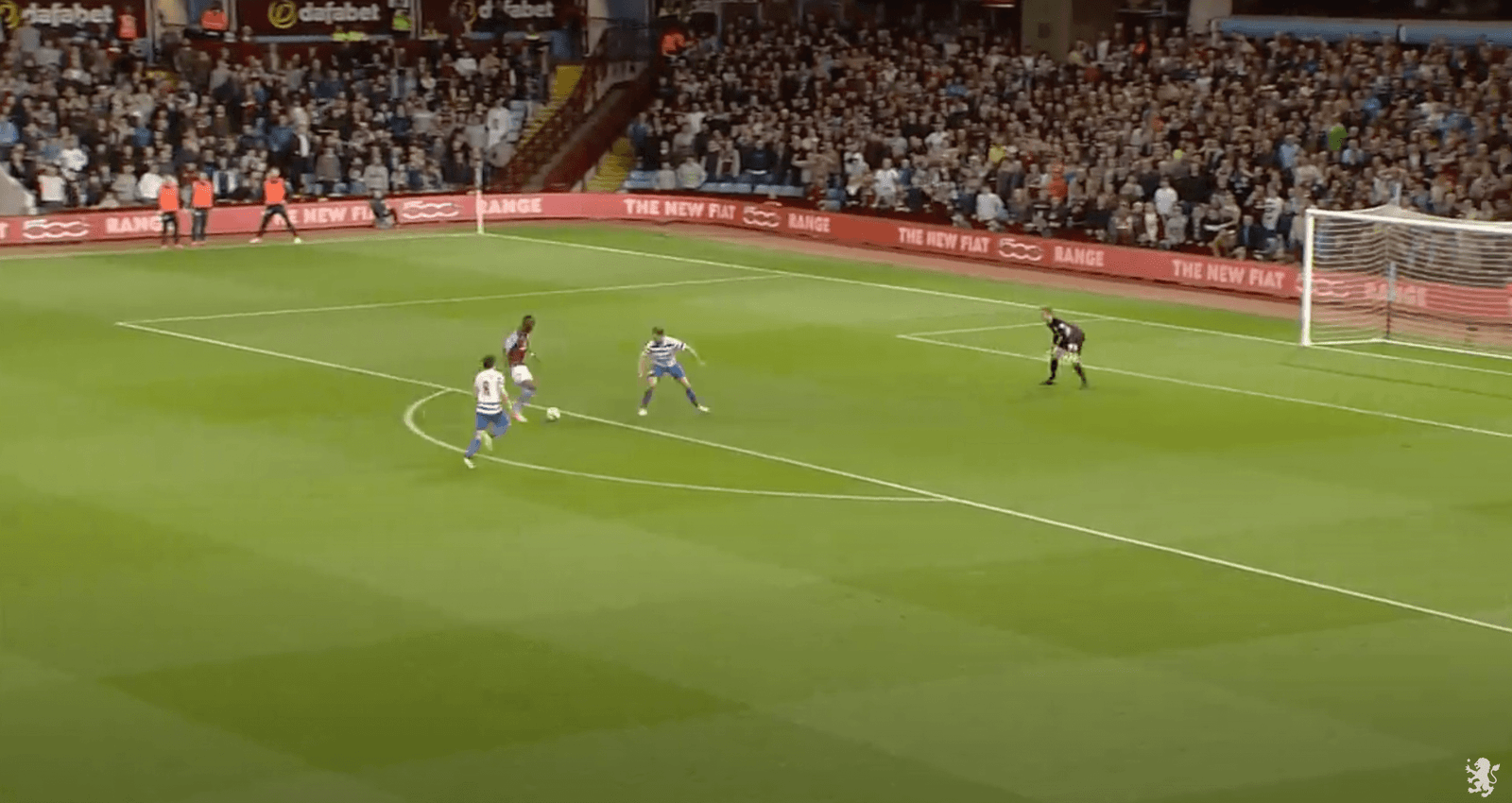
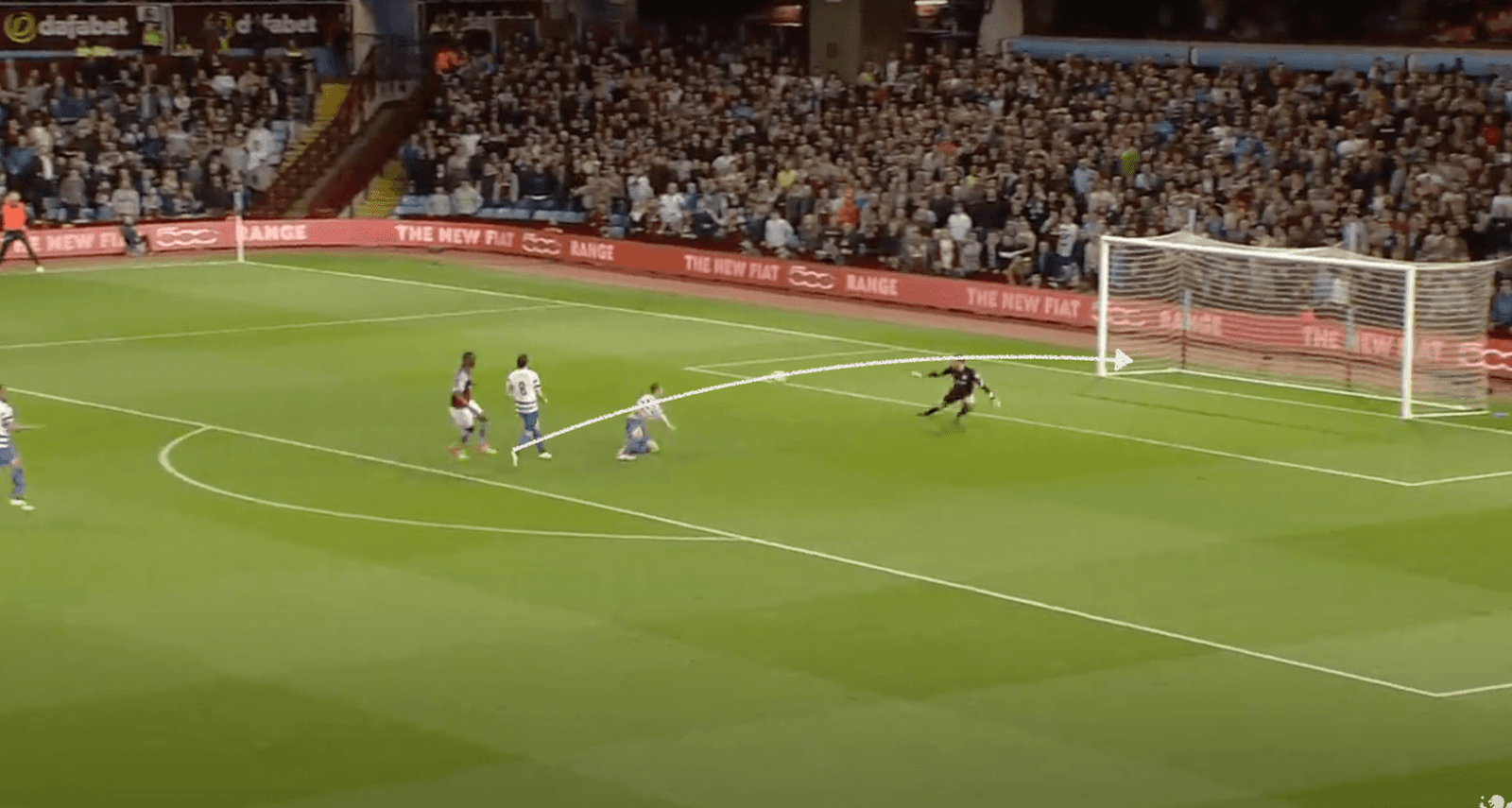
His third strike of the night — which came with Villa down a goal in the dying moments of the match — felt like a total departure.
The Belgian walked up to a dead ball some 25 yards from goal, passing by a shocked Charles N’Zogbia, Villa’s preferred man on set pieces.
“I never ever took free kicks in my life,” says Benteke. “I remember Charles N’Zogbia, he was like, ‘Let me take it!’. I was like, ‘No, no, no’. We were losing as well, 3-2, I had two goals, I was feeling myself. I was like, ‘Tonight is my night’. I told him, ‘No, bro, I got this’. I talked to him in a way (that suggested), ‘Hey, I’m a specialist’ (he laughs). That was funny. This is a striker’s life. When everything goes well you do things that you don’t even know how you did it.”
Benteke’s inch-perfect free kick clattered off the near post and into the net, drawing the home side level and sending Villa Park into bedlam.
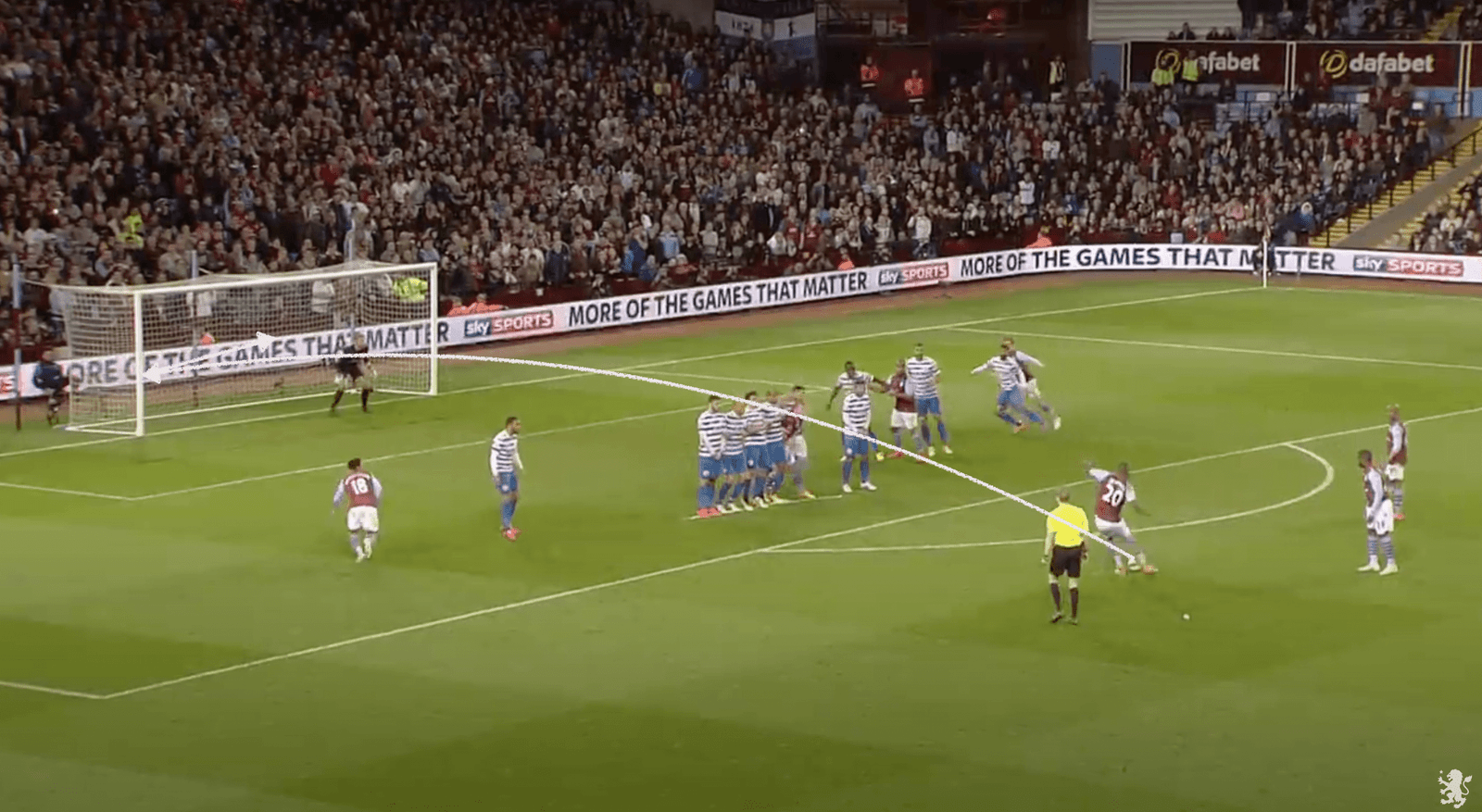
N’Zogbia laughed and trotted over to join Benteke in celebration. The strike did not make Benteke a free-kick specialist. He’s rarely taken them since.
“I live with the moment,” says Benteke. “That’s a striker’s life. Sometimes when you feel yourself you might shoot from 30 yards, something that you never do because maybe prior to that you had two goals and you want the hat trick so you’ll try and do things that, in a normal game you won’t do.”
Benteke’s consistency at Villa earned him the adoration of the club’s fanbase, with one in particular taking things to extreme heights. Prince William was given a pair of Benteke’s socks, which he has sported in charity matches over the years. It’s unclear if he ever washed them.
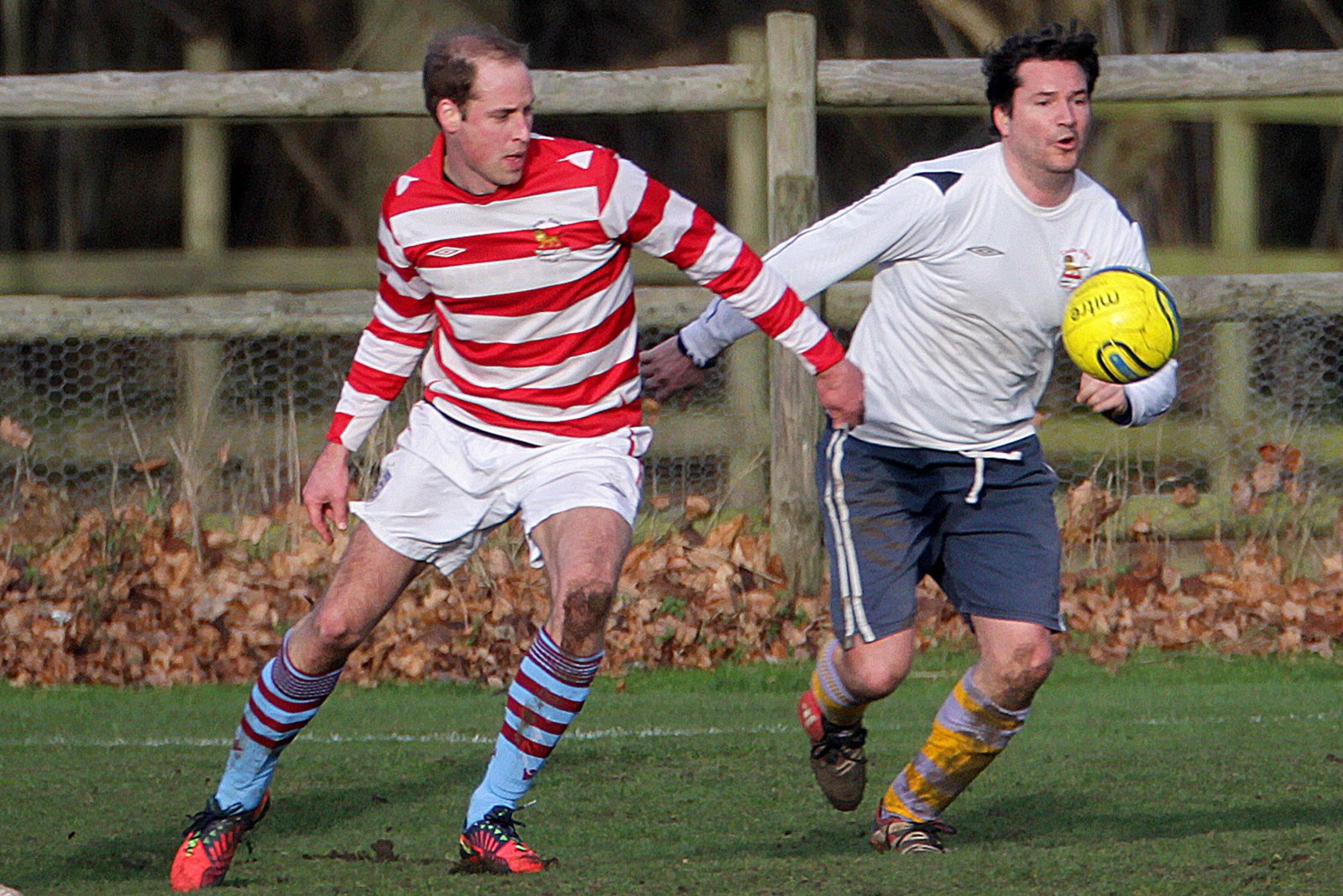
Prince William wearing his Benteke socks in a charity game (Albanpix.com-Picture by Alban Donohoe)
The Belgian striker chuckles.
“I spoke to him when I was with Villa, because he’s a Villa fan,” says Benteke. “I’ve been invited to represent Aston Villa somewhere in London, there was a gala, or a ceremony or something. He’s a really cool guy.”
Exercises like these, when you sit with a player and ask them to watch old footage of themselves, can feel tiresome to some players. Athletes typically prefer to talk about the now. Being asked to relive their moments of glory — particularly when they are under a bit of a dimmer spotlight — can be a challenging exercise, like being in a band that’s constantly asked to play the hits.
You don’t get this from Benteke. Not even when he’s asked about times that were more challenging — the rest of his Premier League career and his time with the Belgium national team. Benteke is proud of every strike.
His play at Villa Park earned a shock transfer to Liverpool, who broke the bank for him. At the time, the amount Liverpool spent to trigger his release clause — £32.5million — made him the club’s second-highest-ever buy. Only Andy Carroll had cost more.
Some had their doubts, like the club’s director of research Ian Graham, who wrote recently in his book about begging Liverpool’s owners not to sign Benteke. But then-manager Brendan Rodgers was dead set, and owner Fenway Sports Group acquiesced. For a spell, it seemed Benteke might fit into Rodgers’ plans but that soon went out of the window. Rodgers was sacked just three months after Benteke’s arrival, to be replaced by Jurgen Klopp.
While Benteke did not fit into Klopp’s plans, he had his moments of brilliance with Liverpool. Before he even presses play on the goal he reviews next, he smiles and reflects on it.
“This goal,” he says, “it’s more than a goal. When I’m walking down the street, it doesn’t matter if you’re a Manchester United fan, Liverpool fan, any fan in the world — they always stop me for this goal. Like kids, grown ups, any type of people, they always ask me about this goal.”
It is entirely clear why. Benteke’s stunning scissor-kick against United is maybe the most spectacular strike of his career. Jordon Ibe’s cross is deflected by Daley Blind at the six-yard box and lofts towards Benteke, who somehow remains entirely unmarked for the entirety of its flight — two and a half seconds that feel like an eternity.
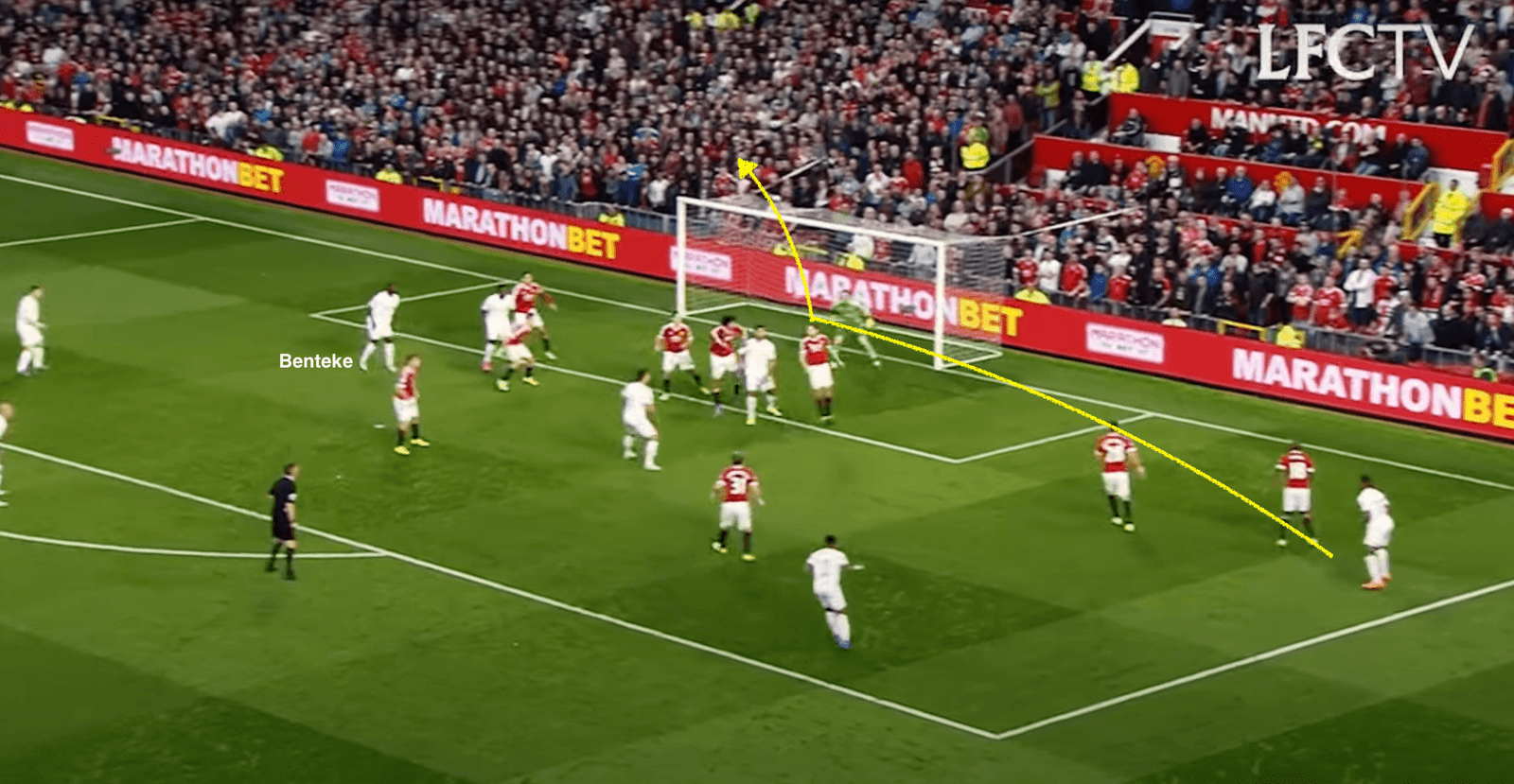
He shuffles backwards several feet, always tracking the ball.
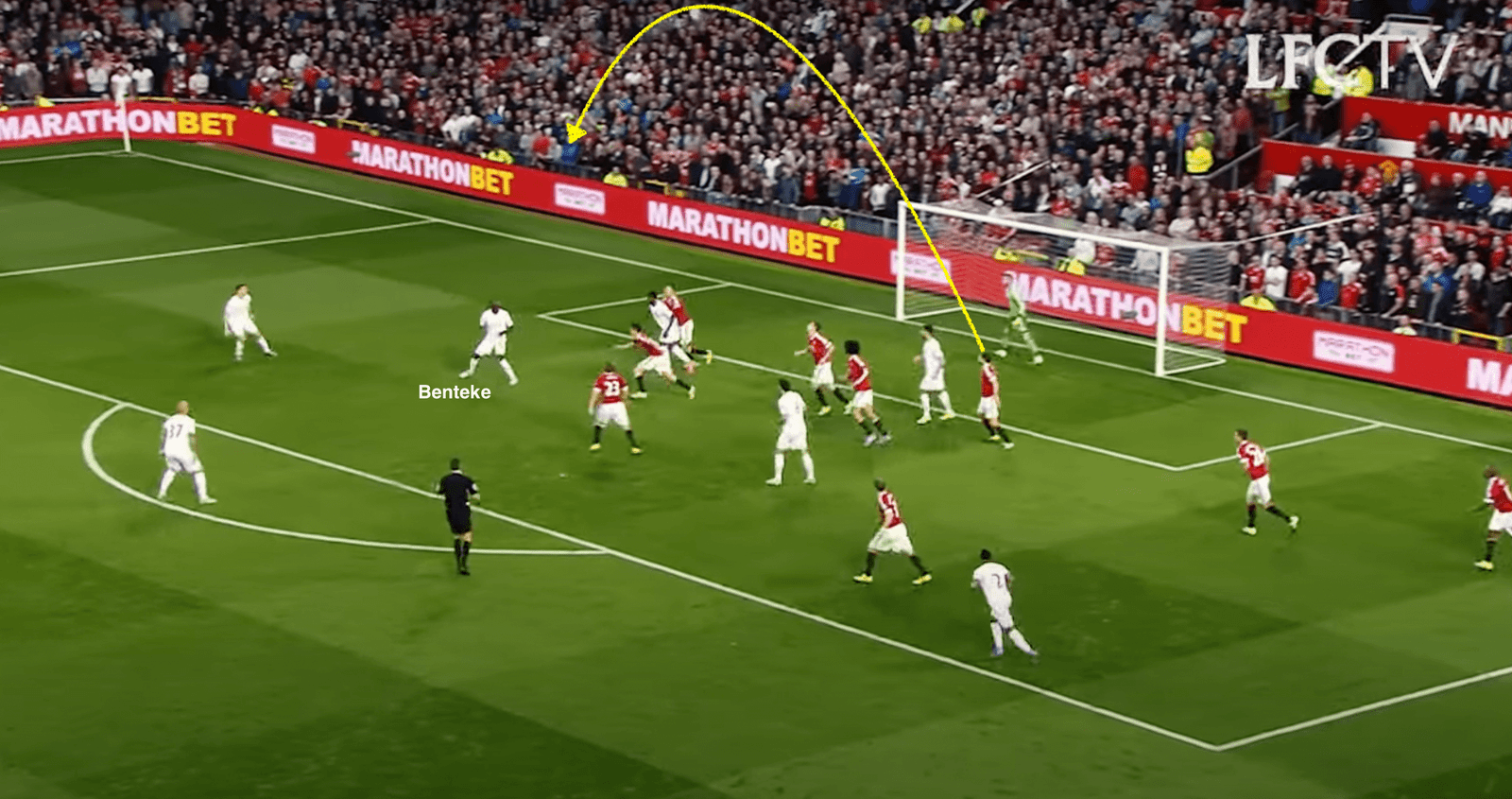
Unmarked, Benteke could have easily headed the ball across the face of goal or towards a team-mate — but that was never going to happen.
“I play with instinct,” says Benteke. “As soon as I saw the ball, I knew I was going to do that and I knew if I made good contact, it was going to be a goal.”
The time and space afforded to Benteke can often be chalked up to his sheer physical strength or size. He is an intimidating presence. His positioning, though, and timing, have always been elite and both are on display here. Benteke, though, is quick to point something else out: he is horribly defended.
“If you look,” he says, rewinding the clip, “They are all ball-watching. If you come back, I think it was Ander Herrera was reacting. He was the first one who was reacting but by then it’s too late. Because I’m under control now.”
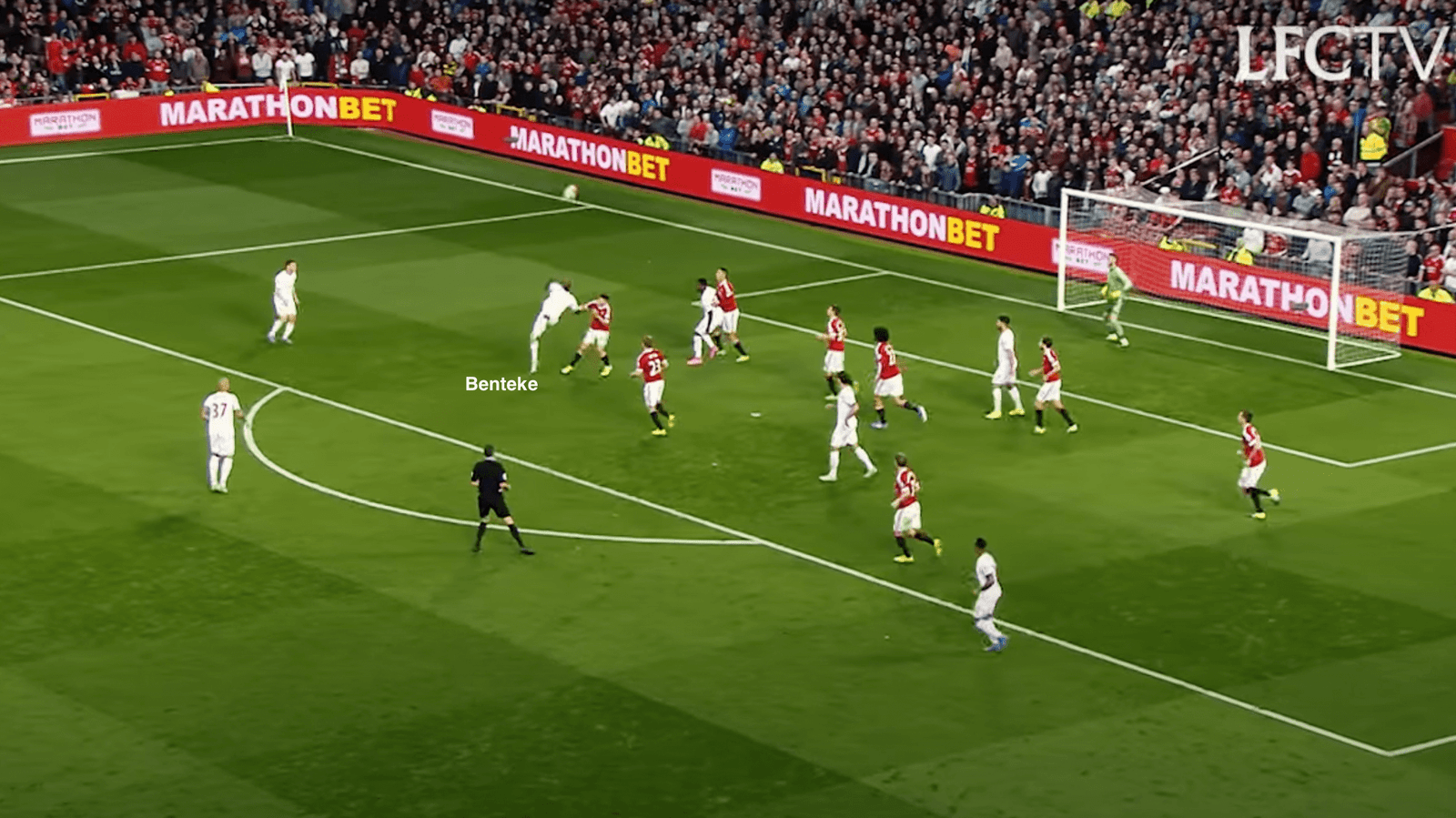
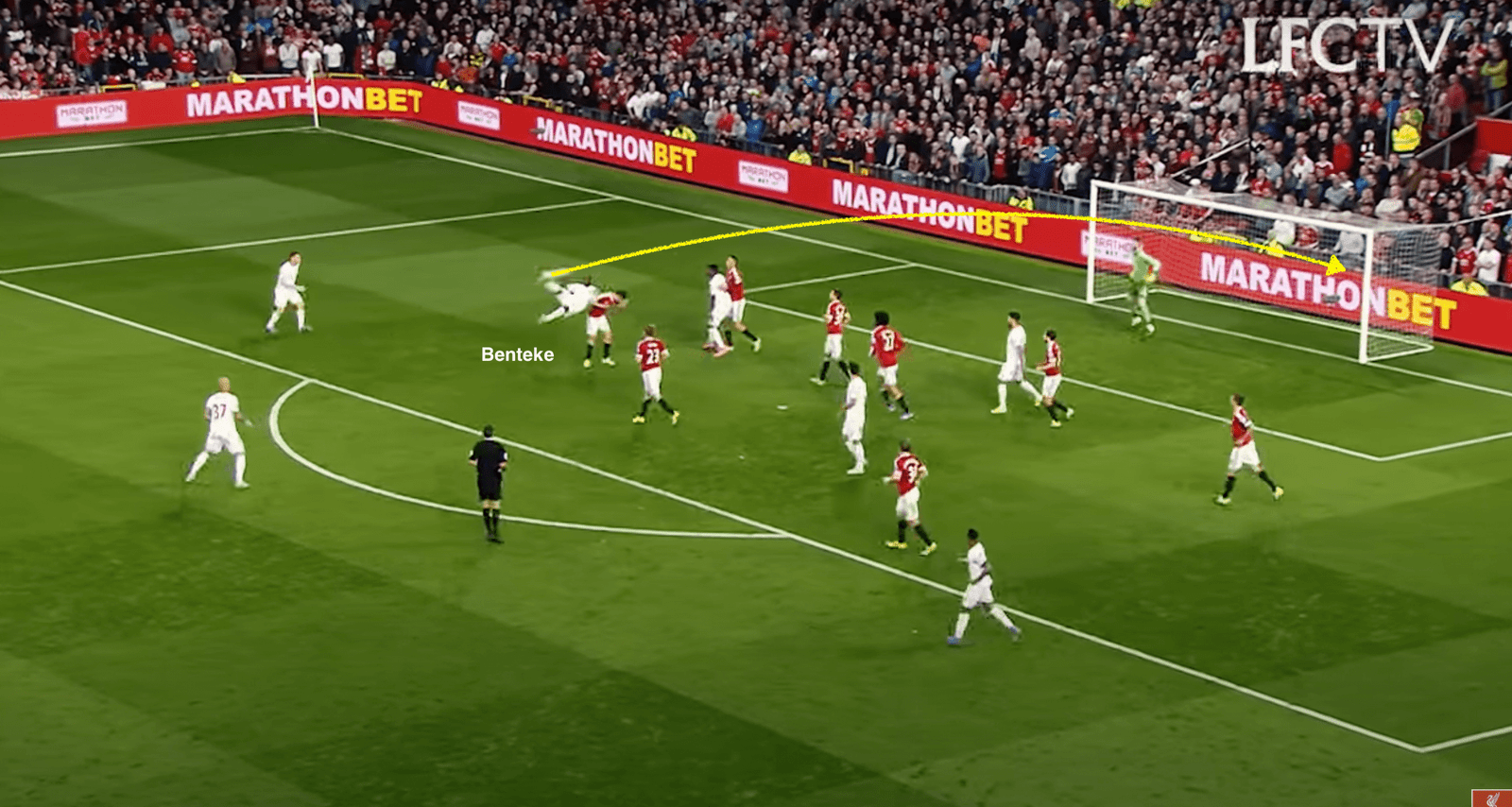
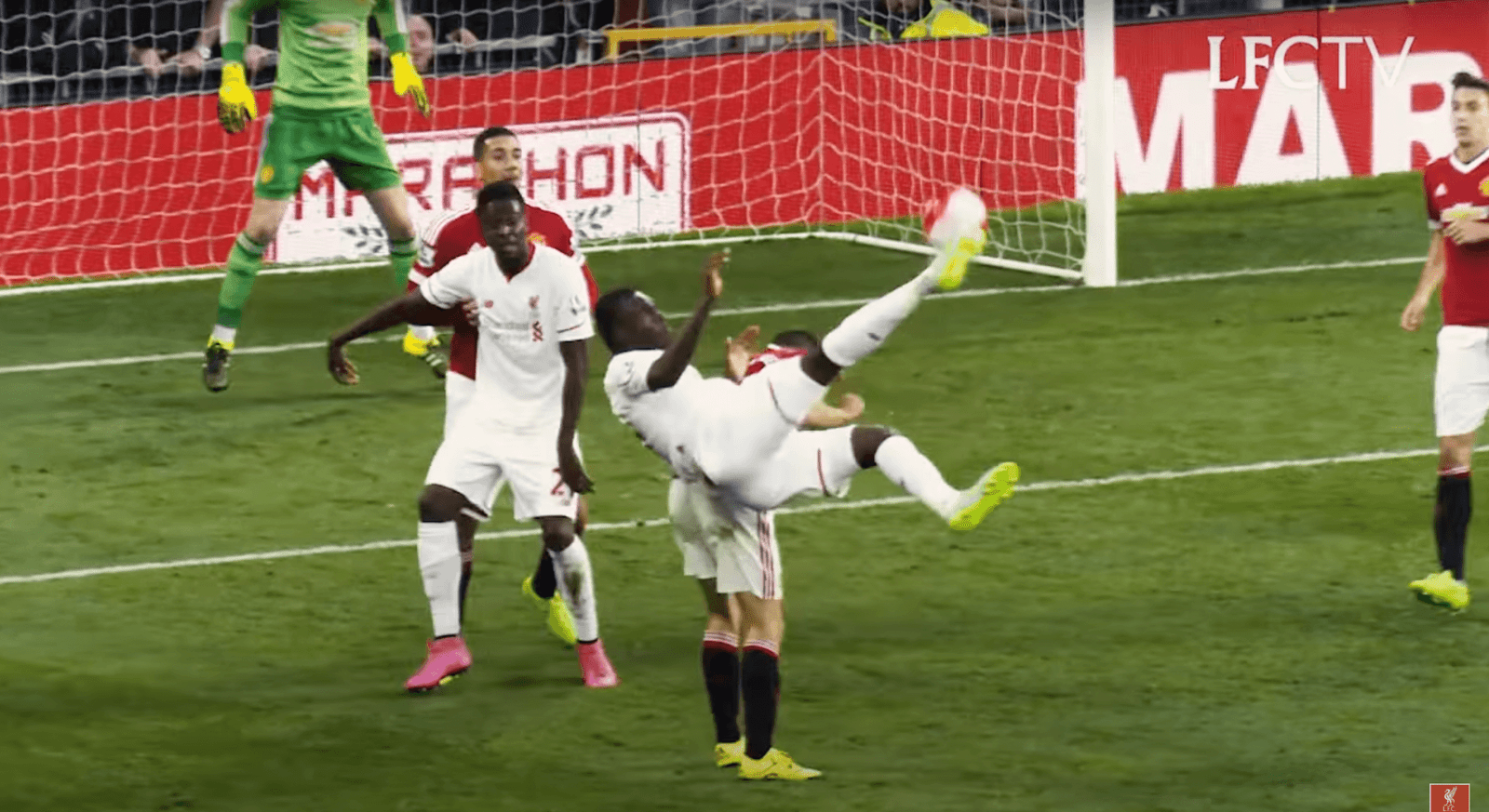
Benteke’s time at Liverpool is viewed by many as a disappointment, a failed investment, a final splurge before the Klopp era’s more focused approach in the market.
In reality, it’s representative of a larger theme, one that’s followed the Belgian throughout his career. His greatest moments often came during low moments for clubs, or in the shadow of other players. Again, he was a productive player throughout the bulk of his career in England.
“I don’t have any regrets (about my time there),” he says. “I love my story. Knowing from where I came, I love my story. I take everything for a blessing, a lesson to learn. I wouldn’t change anything.”
Benteke left Liverpool to become Crystal Palace’s record £27million signing. He was a player of established pedigree identified by then-manager Alan Pardew to be the focal point of his front line and supplied by Andros Townsend and Wilfried Zaha from the flanks.
For a while, that attacking trident clicked. He scored 15 league goals in his first season at Selhurst Park, in 2016-17, the most a Palace player had managed in the top flight since Andrew Johnson 12 years earlier. That tally included a brilliant dinked winner at Premier League champions Chelsea, and two in a 2-1 win on his first trip back to Anfield — both in April 2017, surely one of the best months of his career.
But, where he threatened to flourish under Pardew and Sam Allardyce, he proved less prolific under Roy Hodgson whose tactics saw the wingers often inverted and fewer crosses flung into the box. The next three seasons yielded only six league goals, even if the Belgian’s presence and ability to hold the ball up still benefited the team on occasion. His prowess at defending corners was also invaluable.
He was granted cult status at Palace for the stoppage-time winner against rivals Brighton in February 2021 though — Palace managed only two touches in their opponents’ box that night, but prevailed 2-1 — and a rare flurry of goals late in that Covid season spent largely behind closed doors earned him a new contract. But, with the squad radically overhauled in the summer of 2021, the lure of a fresh start in MLS proved too tempting at the start of the following campaign.
Read the full article here


